Formal Personal Guarantee Cancellation Letter
Subject: Cancellation of Personal Guarantee
Dear [Recipient Name],
I am writing to formally request the cancellation of my personal guarantee associated with [Loan/Agreement/Contract Name and Number]. As of [Effective Date], I request that all obligations, liabilities, and responsibilities attributed to me under this guarantee be formally released.
Please confirm in writing that my personal guarantee has been cancelled and that I am no longer held responsible for any existing or future obligations related to this agreement.
Thank you for your prompt attention to this matter.
Sincerely,
[Your Name]
[Contact Information]
Email Request for Personal Guarantee Release
Subject: Request for Release from Personal Guarantee
Dear [Recipient Name],
I hope this message finds you well. I am reaching out to request a formal release from the personal guarantee I hold for [Loan/Contract Name]. Considering [reason, e.g., full repayment, restructuring, or personal circumstances], I kindly ask that you process this cancellation effective immediately.
Please acknowledge receipt of this email and confirm the release at your earliest convenience.
Thank you for your cooperation.
Best regards,
[Your Name]
Provisional Personal Guarantee Cancellation Letter
Subject: Provisional Release of Personal Guarantee
Dear [Recipient Name],
This letter serves as a provisional request for the cancellation of my personal guarantee linked to [Contract/Loan Name]. I understand that certain conditions may need to be reviewed before final release. I am prepared to provide any additional documentation or information necessary to facilitate this process.
Please notify me regarding any further steps required to complete the cancellation.
Sincerely,
[Your Name]
Informal Personal Guarantee Release Letter
Subject: Personal Guarantee Cancellation
Hi [Recipient Name],
I just wanted to confirm that I am requesting the cancellation of my personal guarantee for [Loan/Contract Name]. I’d appreciate it if you could update me once everything has been processed.
Thanks so much for your help!
Cheers,
[Your Name]
Heartfelt Personal Guarantee Cancellation Request
Subject: Request for Release from Personal Guarantee
Dear [Recipient Name],
I hope this note finds you well. After careful consideration, I am requesting the cancellation of my personal guarantee associated with [Loan/Contract Name]. This guarantee has been a significant responsibility, and having it released will provide immense relief and allow me to focus on my personal and professional commitments without undue stress.
I sincerely appreciate your understanding and support in processing this request promptly.
Warm regards,
[Your Name]
What / Why of Personal Guarantee Cancellation Letters
A Personal Guarantee Cancellation Letter is a formal or informal communication used to request the release of an individual from obligations they have guaranteed on behalf of another party.
The purpose of this letter is to:
- Formally notify the lender or relevant party of the request.
- Document the cancellation for legal and personal records.
- Ensure the guarantor is no longer liable for future obligations.
- Provide a written record to prevent misunderstandings or disputes.
Who Should Send a Personal Guarantee Cancellation Letter
- The guarantor themselves, who wants to be released from their obligations.
- In cases of corporate guarantees, an authorized representative of the guarantor.
- Sometimes, a legal representative or attorney may send it on behalf of the guarantor.
- It is always preferable that the sender has clear legal authority to make the request.
Whom the Letter Should Be Addressed To
- The bank, financial institution, or lender holding the guarantee.
- The company or entity benefiting from the guarantee.
- Legal or contract management departments if the organization is large.
- Occasionally, to an attorney or mediator if the guarantee is disputed or requires legal oversight.
When to Send a Personal Guarantee Cancellation Letter
- After full repayment of the associated loan or fulfillment of contractual obligations.
- When refinancing or restructuring the loan, removing personal guarantees.
- Upon mutual agreement between the guarantor and lender.
- If the guarantor wishes to withdraw from the agreement due to personal or financial changes.
- When the guarantee period has expired as per contract terms.
How to Write and Send the Letter
- Start with a clear subject line: "Request for Personal Guarantee Cancellation."
- Use a professional and polite tone, adjusting formality to the recipient.
- Include relevant contract or loan details for clarity.
- Mention reasons if appropriate (optional but can facilitate approval).
- Request confirmation in writing and provide contact information.
- Choose the mode of sending:
- Email: Quick, formal, keeps electronic record.
- Printed Letter: Official, may be required for legal or banking purposes.
- Keep a copy for your personal and legal records.
Requirements and Prerequisites Before Sending
- Full understanding of the terms of the original personal guarantee.
- Documentation proving repayment or fulfillment of obligations.
- Any prior approvals or consents required by the lender.
- Accurate contact details for the recipient.
- Optional: Legal consultation to ensure proper wording and avoid unintended liabilities.
Formatting Tips for Personal Guarantee Cancellation Letters
- Length: 1–2 pages maximum, concise and focused.
- Tone: Formal or professional for institutions; casual or informal may be used for smaller entities.
- Wording: Clear, polite, and unambiguous. Avoid complex legal jargon unless necessary.
- Mode: Email for speed and record, printed letter for official confirmation.
- Etiquette: Address recipient respectfully, use proper greetings and closings.
Pros and Cons of Sending a Personal Guarantee Cancellation Letter
Pros:
- Provides formal release from liability.
- Protects the guarantor legally.
- Creates a documented record for future reference.
Cons:
- Lender may reject the request if conditions are unmet.
- Could delay finalizing related financial agreements.
- Requires proper timing and documentation to be effective.
FAQ About Personal Guarantee Cancellation Letters
Q: Can I cancel a personal guarantee unilaterally?
A: Usually not; lender approval is required unless the contract allows unilateral cancellation.
Q: How long does it take for the cancellation to be effective?
A: It depends on the lender; confirmation in writing usually defines the effective date.
Q: Do I need to provide reasons for cancellation?
A: Not always, but providing context can facilitate approval.
Q: Is legal advice necessary?
A: It is recommended, especially for large guarantees or complex agreements.
Elements and Structure of a Personal Guarantee Cancellation Letter
- Subject line: Clearly state purpose.
- Greeting: Address the recipient formally.
- Introduction: State who you are and your relation to the guarantee.
- Body:
- Reference the guarantee and associated agreement.
- State reason or condition for cancellation (optional).
- Request confirmation of release.
- Conclusion: Thank the recipient, indicate readiness to provide documentation.
- Closing: Formal sign-off.
- Attachments: Include supporting documents, proof of repayment, or prior correspondence.
After Sending / Follow-up Actions
- Wait for written acknowledgment or confirmation.
- Follow up if no response is received within a reasonable timeframe (usually 7–14 days).
- Keep copies of all communications for records.
- Confirm the release has been processed and obtain a final official statement.
- Update personal and financial records to reflect cancellation.
Tricks and Tips for Effective Personal Guarantee Cancellation Letters
- Keep your message concise but complete.
- Reference exact contract or loan numbers for clarity.
- Always request written confirmation.
- Send through traceable methods (email with read receipts or registered mail).
- Consider attaching supporting documents upfront to reduce back-and-forth.
- Maintain polite and professional language; avoid confrontation.
Common Mistakes to Avoid
- Failing to reference the specific agreement or contract.
- Not providing sufficient information for the lender to process the request.
- Using ambiguous or informal language that may lead to misinterpretation.
- Assuming unilateral cancellation without lender approval.
- Neglecting to follow up for confirmation.
Does It Require Attestation or Authorization?
- For formal bank or corporate guarantees, official attestation or notarization may be required.
- Some lenders may require signatures of authorized representatives or corporate seals.
- Email requests may not need attestation but should be sent from verified accounts.
- Always check with the lender’s policy before sending the letter.
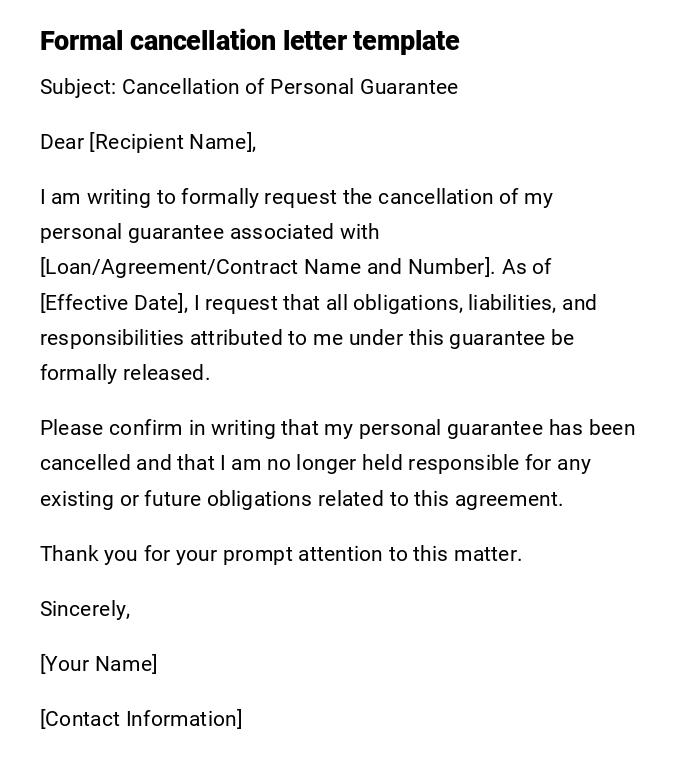
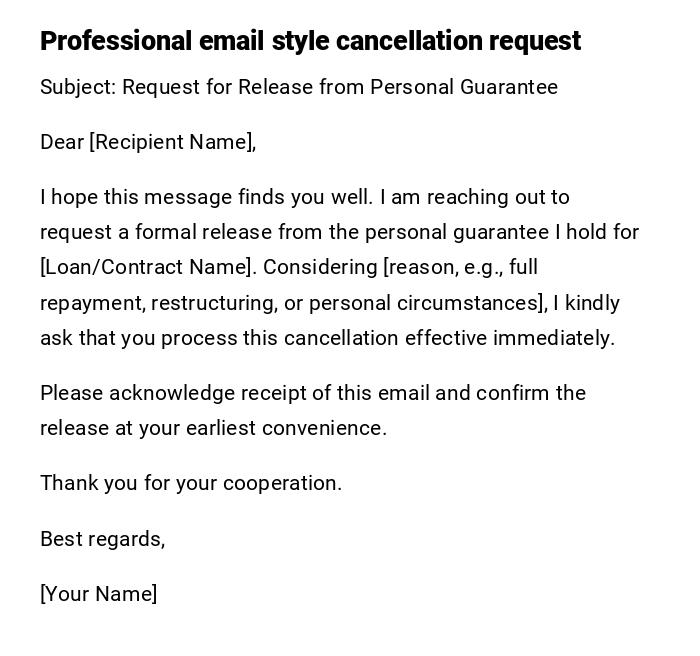
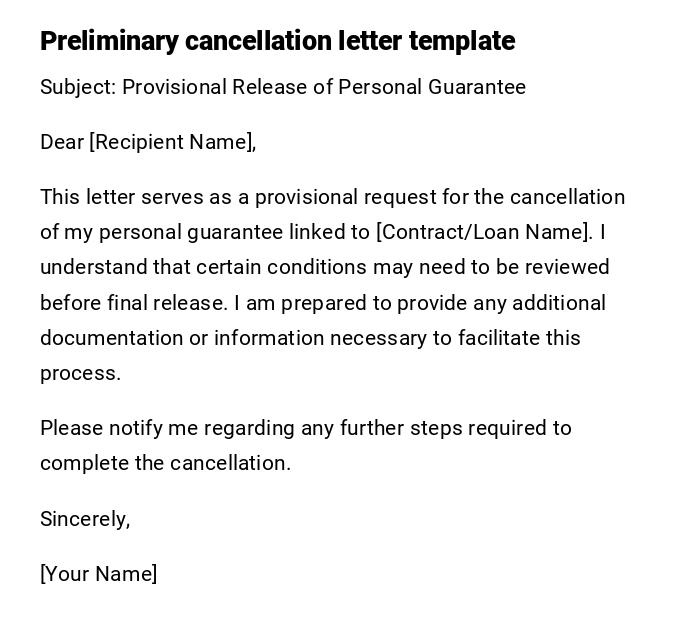
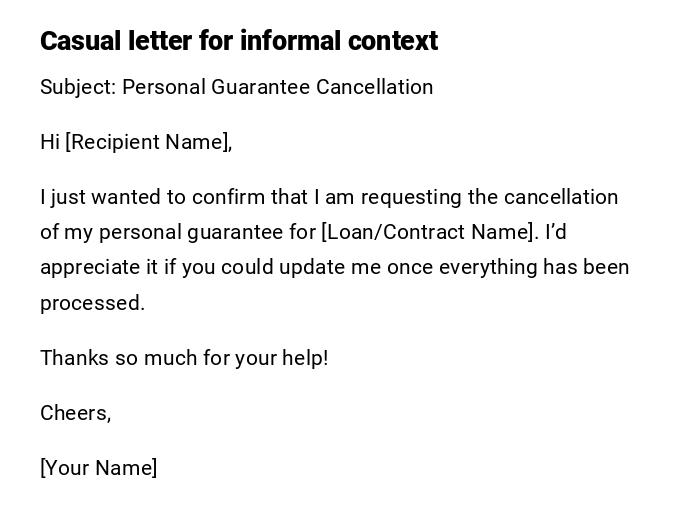
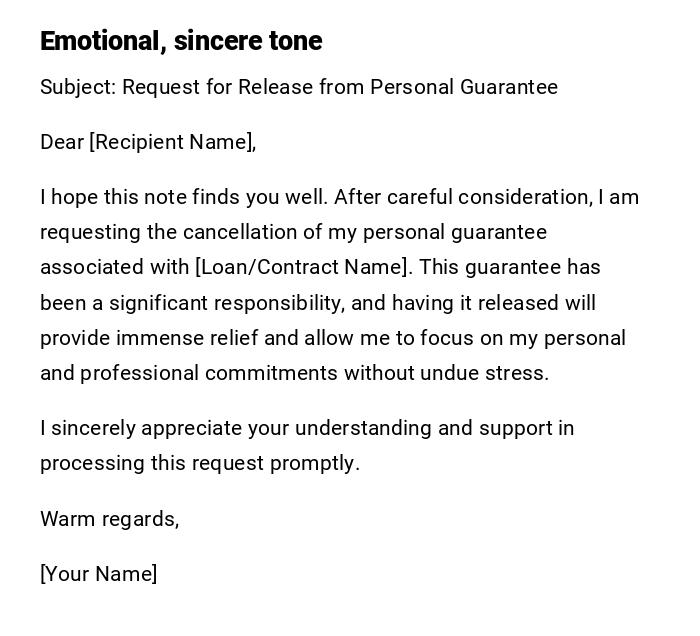

 Download Word Doc
Download Word Doc
 Download PDF
Download PDF